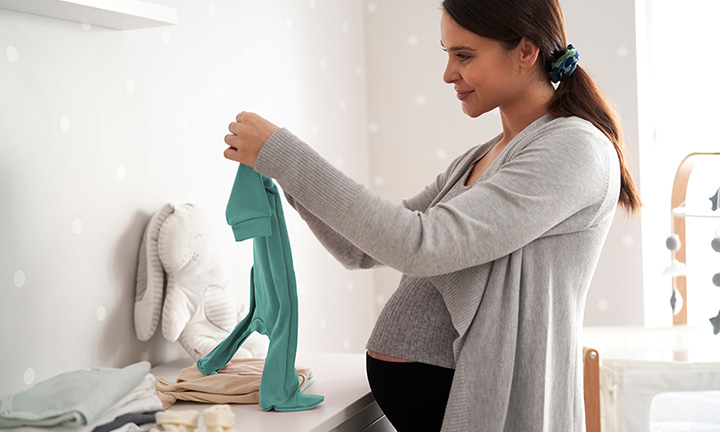
What Is Nesting in Pregnancy? Signs, Timing, & Tips
What is nesting in pregnancy? It’s a common experience—especially in the final weeks—where expectant parents feel a burst of energy and a strong urge to clean, organize, and prepare their home for their baby’s arrival. While not everyone experiences it, nesting during pregnancy can be both practical and emotional, helping you feel more prepared and in control before birth.
Quick facts about nesting during pregnancy:
Whether you’re folding onesies or prepping freezer meals, nesting during pregnancy is one way to get ready for life with your newborn. Let’s explore what drives this instinct, when it can happen, and how to do it safely.
What is Nesting During Pregnancy?
Nesting during pregnancy is that sudden urge to get your space just right before your baby arrives. Maybe you’re wiping down every corner, folding tiny clothes, or reorganizing shelves you haven’t touched in months. This burst of energy—often called the nesting instinct—isn’t a medical term, but it’s a familiar part of late pregnancy for many parents.
So, what does nesting mean in pregnancy? It’s about creating a calm, comfortable place for you and your little one. For some, nesting during pregnancy also means spending more time with people who make you feel supported and at ease.
Common Safe Nesting Activities
If the urge to clean and organize has you picturing sparkling floors and tidy shelves, go ahead and put that energy to good use. Now can be a great time to tackle little projects that will make life easier once your baby arrives. Just remember—this isn’t a pass to scrub until you’re exhausted. Take breaks, pace yourself, and ask for help when you can.
Here are some safe ways to channel your nesting energy during pregnancy:
Try our interactive Hospital Bag Checklist tool to make sure you have everything you want to bring along for delivery day.
Is Nesting a Sign Labor Is Near?
Nesting can be a sign that your body is getting ready for delivery, but it doesn’t guarantee labor is just around the corner. Some people experience nesting feelings a few days before giving birth, while others notice them weeks ahead. So, how long after nesting does labor start? There’s no set timeline. For some, labor may begin within hours or days; for others, it could still be a few weeks away.
This unpredictability means that while nesting during pregnancy may indicate hormonal changes and a natural instinct to prepare, it’s not a medically reliable sign that labor is imminent. Labor signs may include regular contractions, back pain, or water breaking.
Always check in with your healthcare provider if you think you might be in early labor or if you're unsure about what your body is telling you.
Tips for Safe and Healthy Nesting
When the nesting instinct is strong, it can be tempting to scrub and sanitize every corner of your home. However, during pregnancy, it’s best to be cautious with cleaning methods. Certain products, especially those with strong fragrances or harsh chemicals, may be irritating or harmful to you or your baby.
If you would like to clean, choose gentler options such as baking soda, vinegar, or mild soap. Avoid using bleach or strong chemical cleaners, and avoid climbing ladders or lifting heavy objects to reduce the risk of injury.
It’s also important to pace yourself. You don’t have to complete every task before your baby arrives. A clean and organized home can be helpful, but it doesn’t need to be spotless—focus on creating a safe, comfortable environment and leave less urgent chores for later.
For more practical tips on preparing for your baby’s arrival, explore the New Parents’ Guide.
Nesting Your Way
Every pregnancy is different, and so is the way the nesting instinct shows up. For some parents, it means reorganizing every drawer; for others, it’s about preparing just the essentials. Both approaches are completely fine.
There’s no “right” way to do nesting during pregnancy—and it’s equally normal to wonder, “Why am I not nesting in pregnancy?” The answer is that it’s perfectly fine if you don’t feel the urge at all. What matters most is finding a balance that works for you, keeps you comfortable, and helps you feel ready to welcome your baby.
FAQS AT A GLANCE
Just about anything you do during your pregnancy to prepare for your baby’s arrival could be called the nesting instinct. It might mean buying baby supplies or reorganizing your home; either way, it’s about getting ready.
The Bottom Line
Whether or not you experience a strong nesting phase during pregnancy, there are still many ways to prepare for your baby’s arrival. It’s fine if you don’t feel like scrubbing every surface, and it’s equally fine if organizing helps you feel more ready. Do what works for you, and don’t hesitate to ask for help when needed.
You can also make the most of your preparation by downloading the Pampers Rewards App, which offers digital offers on baby essentials—helping you stock up while you get your home ready.
Read more about Pregnancy
Join a World of Support
through Pregnancy and Parenthood.
TRACK WITH TOOLS
LEARN WITH EXPERTS
GET REWARDED







